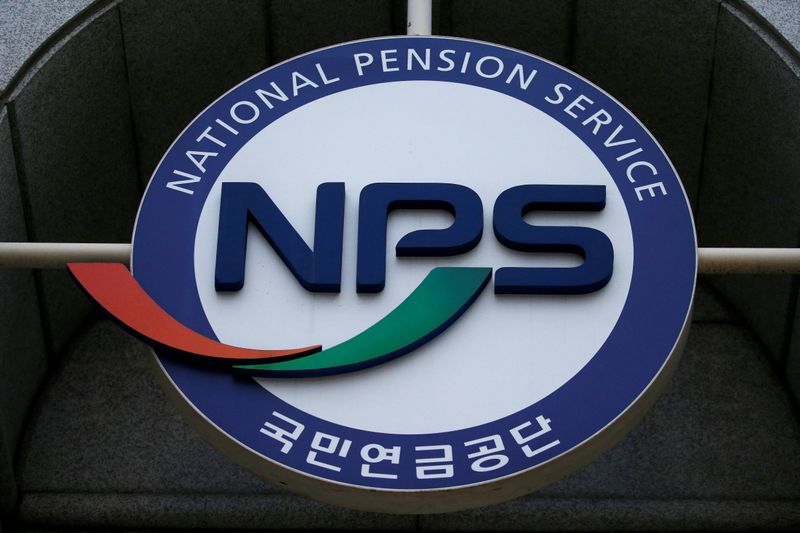Move to hinterland triggers brain drain at Korea’s mega pension fund

© Reuters. FILE PHOTO: The logo of National Pension Service (NPS) is seen at its branch office in Seoul, South Korea, November 4, 2016. REUTERS/Kim Hong-Ji
By Cynthia Kim, Jihoon Lee and Yena Park
SEOUL (Reuters) – Earlier this year, Lee left her fund management job at South Korea’s national pension fund, the world’s third-largest, fed up with long commutes between her home in Seoul and her office in Jeonju, 200 kilometers away.
For four years, Lee lived in a studio apartment in Jeonju, a city of 658,000, on weekdays, and traveled back to Seoul for the weekend. She feared her family would break up if she didn’t make the hard decision to quit.
Lee is one of some 140 money managers who has left the 930.5 trillion won ($788 billion) National Pension Service since 2016, shortly before it moved to Jeonju, a sleepy provincial capital, as part of the government’s relocation of major agencies away from the capital Seoul.
That is almost half the 320 currently working at the fund’s investment arm, an alarming brain drain for the main public retirement plan of Asia’s fourth-largest economy and a major investor in Korean blue-chips such as Samsung Electronics (OTC:) and Hyundai Motor Co..
“Staying in Jeonju for the weekdays, I felt I was missing out on so much of my life, I couldn’t stand it anymore and decided to head up to Seoul,” said Lee, who now works for an asset manager based in Seoul’s financial district and agreed to be identified only by her surname.
With assets valued at nearly half the nation’s gross domestic product, the NPS manages pensions for private sector workers and self-employed South Koreans.
A massive wave of retirements due in coming years in the world’s fastest aging society has raised the stakes for management at the fund.
Over the past five years, however, the NPS has only filled 57% of jobs it opened.
An NPS official said that partly reflects the greater number of openings as the fund grows investments but acknowledged the issues around the relocation.
“Although it has stabilised a lot compared to before our relocation to Jeonju, the issue regarding manpower seems to have re-emerged because we recently increased job openings in a large scale which seemingly pushed up the relative vacancy rate,” the official told Reuters in response to queries.
“As our overseas investment expands, so are opportunities to work abroad, and efforts are being made to motivate talent to stay in service by improving working conditions, and we also have talent development programmes.”
To plug staff shortages, it removed the mandatory one-year work experience requirement for the first time from its job postings in September and began offering opportunities to work abroad, even to domestic equity fund managers.
The NPS’s annualised investment return for 2020 was 9.7%, below 25.15% for Japan’s GPIF in fiscal 2020 and 20.4% at Canada Pension Plan Investment Board.
That partly reflects the more conservative nature of its investments, fund managers…
Read More: Move to hinterland triggers brain drain at Korea’s mega pension fund
